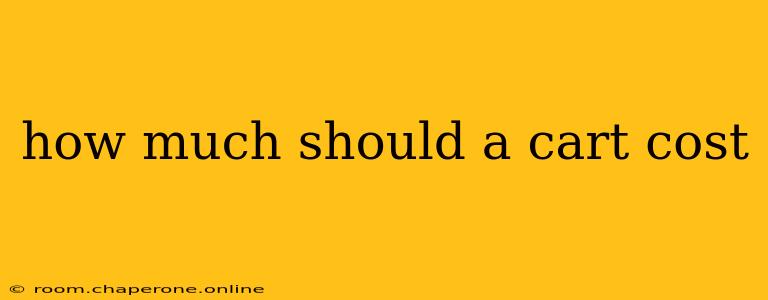The cost of a shopping cart depends heavily on several factors. There's no single answer to "how much should a cart cost?" Instead, let's break down the key considerations to help you determine the right price point for your needs.
Types of Shopping Carts and Their Price Ranges
The market offers a wide variety of shopping carts, each with a different price tag. The cost is significantly impacted by the cart's material, features, and intended use.
1. Basic Metal Shopping Carts:
- Price Range: $50 - $200+ per cart.
- Description: These are typically made of steel or aluminum, durable and simple. They're common in grocery stores and smaller retail environments. Price varies depending on size, features (like child seats), and the quantity purchased. Bulk orders often receive significant discounts.
2. Heavy-Duty Metal Shopping Carts:
- Price Range: $200 - $500+ per cart.
- Description: Built for robust use and heavier loads, these carts are often found in warehouse settings or bulk retailers. They feature reinforced frames and wheels designed for longevity.
3. Plastic Shopping Carts:
- Price Range: $30 - $150+ per cart.
- Description: Lighter and more maneuverable than metal carts, plastic options are becoming increasingly popular due to their lower weight and easier maintenance. However, they might not be as durable as their metal counterparts. The price can fluctuate based on the type of plastic used and its overall construction.
4. Specialty Shopping Carts:
- Price Range: Varies greatly, from $100 to thousands of dollars.
- Description: This category includes carts designed for specific needs, such as:
- Grocery carts with child seats: Adding a child seat increases the cost.
- Heavy-duty carts for industrial use: These are designed for exceptionally heavy loads and rough terrain.
- Specialty retail carts: For example, carts designed for clothing stores or libraries often have unique features driving up the price.
- E-commerce shopping cart software: This is a completely different category, with costs ranging from free (with limitations) to hundreds or thousands of dollars per month depending on features and scalability.
Factors Influencing Shopping Cart Costs:
Beyond the basic type, several other factors contribute to the final cost:
- Material: Steel is generally less expensive than aluminum or high-impact plastics.
- Manufacturing Quality: Higher-quality carts with reinforced frames and better wheels will cost more.
- Features: Child seats, extra storage compartments, and ergonomic handles all add to the price.
- Quantity Purchased: Bulk purchases usually result in significant discounts.
- Customization: Adding your company logo or custom colors increases the cost.
- Shipping and Handling: Consider transportation costs, particularly for large orders.
- Maintenance and Repair: Durable carts may require less maintenance over their lifespan, offsetting higher initial costs.
Choosing the Right Shopping Cart:
To determine the appropriate cost, you need to:
- Identify your needs: What will the cart be used for? How much weight will it carry? How frequently will it be used?
- Set a budget: Establish a realistic price range based on your financial resources.
- Research suppliers: Compare prices and features from different vendors.
- Consider long-term costs: Factor in maintenance, repair, and replacement costs over the cart's lifespan.
By carefully considering these factors, you can make an informed decision about how much to spend on a shopping cart that meets your specific needs and budget. Remember to always prioritize quality and durability to ensure a worthwhile investment.

